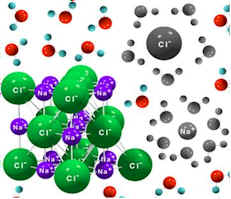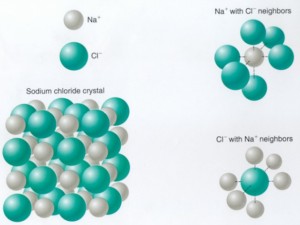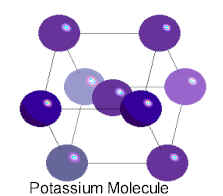Potassium – Why is it an Important Mineral for Your Health
 Potassium is an electrolyte. An electrolyte is a mineral that dissolves in water and carries an electrical charge. In your body, potassium, sodium, and chloride are the electrolyte minerals. Since the body is made mostly of water, these electrolytes can be found everywhere in your body.
Potassium is an electrolyte. An electrolyte is a mineral that dissolves in water and carries an electrical charge. In your body, potassium, sodium, and chloride are the electrolyte minerals. Since the body is made mostly of water, these electrolytes can be found everywhere in your body.
Electrolytes keep your body in balance. They keep the amount of water in your body in balance, carry impulses along your nerves, help make your muscles contract and relax, and keep your body from becoming too acidic or alkaline. You need electrolytes to carry glucose (blood sugar) and other nutrients into your cells and to carry waste products and extra water out again. Electrolytes also regulate your blood pressure and your heartbeat.
The levels of these three electrolytes have to be kept in balance. Too much sodium and not enough potassium, and your blood pressure could shoot up to unhealthy levels
Requirements:
Every single living cell on earth – plant or animal – needs potassium, sodium, and chloride, which means that there are plenty of them in your food. One of the reasons processed foods are a problem is that they are very high in sodium (salt). Too much sodium, not too little, is a much bigger health problem.
 When a person is sick with vomiting or diarrhea, they might quickly lose so many electrolytes (especially potassium) that they run short. Unless you replace the fluids and electrolytes quickly, this can be serious, especially in small children.
When a person is sick with vomiting or diarrhea, they might quickly lose so many electrolytes (especially potassium) that they run short. Unless you replace the fluids and electrolytes quickly, this can be serious, especially in small children.
If you are low on potassium, you might get muscle cramps in your legs (this sometimes happens to athletes who sweat a lot in really hot weather). If you’re low on potassium, you might feel nauseous and very weak and listless.
Sodium and chloride deficiencies are uncommon since you get both elements from salt. Even when you sweat buckets, you still have plenty of salt in your body. It’s much more important to replace the lost water.
There is a balance of potassium & salt, which is 2:1. Balanced food is when you get this – twice as much potassium as salt. Processed foods show the potassium and salt on the label,s and it is good to check. If you’re eating too much salt, you need to balance it with food high in potassium
Where do I get potassium?
 Potassium is high in the following:
Potassium is high in the following:
Alphabetically:
Avocado – 1/2 medium – 550 mg
Banana – 1 medium – 451
Beef, ground – 3 ounces – 205
Black beans – 1 cup – 801
Broccoli, cooked – 1/2 cup – 228
Cantaloupe – 1 cup – 494
Carrot, raw – 1 medium – 233
Cauliflower, cooked – 1/2 cup – 200
Chicken – 3 ounces – 195
Chickpeas – 1 cup – 477
Corn – 1/2 cup – 204
Flounder – 3 ounces – 292
Kale – 1 cup – 329
Kidney beans – 1 cup – 713
Kiwi – 1 medium – 252
Lentils – 1 cup – 731
Milk – 8 ounces – 381
Okra – 1/2 cup – 257
Orange – 1 medium – 250
Orange juice – 8 ounces – 474
Potatoes, baked with skin – 1 medium – 844
Prune Juice – 8 ounces – 706
Spinach, cooked – 1/2 cup – 419
Strawberries – 1 cup – 247
Sweet potatoes – 1 medium – 397
Tomato – 1 medium – 397
Tomato juice – 6 ounces – 658
Watermelon – 1 cup – 186
Wheat Germ – 1/4 cup – 259
Most Potassium to less:
Potatoes, baked with skin – 1 medium – 844
Black beans – 1 cup – 801
Lentils – 1 cup – 731
Kidney beans – 1 cup – 713
Prune Juice – 8 ounces – 706
Tomato juice – 6 ounces – 658
Avocado – 1/2 medium – 550 mg
Cantaloupe – 1 cup – 494
Chickpeas – 1 cup – 477
Orange juice – 8 ounces – 474
Banana – 1 medium – 451
Spinach, cooked – 1/2 cup – 419
Sweet potatoes – 1 medium – 397
Tomato – 1 medium – 397
Milk – 8 ounces – 381 (whole milk)
Kale – 1 cup – 329|
Flounder – 3 ounces – 292
Wheat Germ – 1/4 cup – 259
Okra – 1/2 cup – 257
Kiwi – 1 medium – 252
Orange – 1 medium – 250
Strawberries – 1 cup – 247
Carrot, raw – 1 medium – 233
Broccoli, cooked – 1/2 cup – 228
Beef, ground – 3 ounces – 205
Corn – 1/2 cup – 204
Cauliflower, cooked – 1/2 cup – 200
Chicken – 3 ounces – 195
Watermelon – 1 cup – 186
So a hamburger with a bun with tomato, and French Fried potatoes – yes? But how much salt is on those French Fries or put into the beef, or in the buns – just things to think about. You need a lot more potassium to balance the salt intake of that type of meal. (Oh, yes, you have to also consider the sugar content of this type of meal.)
What does potassium do? Fun Facts about Potassium….
How does potassium regulate blood pressure? It is believed it has something to do with potassium’s ability to pump sodium out of the body’s cells and reduce body fluid. It also affects the blood vessels and resistance. It may modify the way blood vessels react to circulating hormones that affect blood pressure.
Potassium is also necessary for good muscle contraction, healthy electrical activity in the heart, and rapid transmission of nerve impulses throughout the body. This is why heartbeat irregularities are considered a classic sign of potassium deficiency. Other symptoms of deficiency can include muscle weakness, numbness and tingling in the lower extremities, nausea, vomiting, confusion, and irritability.
Weight Loss & Sugar Cravings
During the day, the body uses stored sugar – glycogen – gotten from the liver and muscles. It is there, ready to be used. In order to store the sugar, the body needs potassium. If the body cannot store the sugar, it turns it into fat. When you don’t have the sugar from glycogen, the body will crave sugar. Getting sufficient potassium and the body will not crave sugar and will be able to use the stored sugar for energy.
Most people get around 2650 milligrams of potassium every day. That’s not enough. You should get 7 cups of vegetables a day to get enough potassium in your diet every day. (A serving or cup is about the size of your fist).
Why not simply take a supplement? Dietary sources of potassium are better tolerated than pharmacologic preparations, experts agree. They may be necessary to those who take diuretic medications because these drugs help the body lose excess water but also deplete the potassium supply.
Too much potassium (more than 5000 milligrams) can upset the balance of minerals in your body and cause heart and kidney problems. Other potential side effects include muscle weakness, tingling in the hands, feet, or tongue, and a slow or irregular pulse. Thus, people with diabetes or kidney disease should consult their doctor before taking potassium supplements, as should people on certain medications, including anti-inflammatory drugs, ACE inhibitors and heart medicines such as heparin.
Get potassium from a food source for the best results.
What causes Low Potassium? (Hypokalemia)
Potassium is one of the most important minerals in the body. Unfortunately, it is really hard to get enough of it. We need a lot, and most people don’t eat nearly enough vegetables to keep their levels in the normal range. And on top of that, there are several other things that can deplete your potassium levels, such as vomiting or medications. In this article, Dr. Berg discusses those top hypokalemia causes and shares with you how to avoid this problem.
RECOMMENDED:
Potassium foods or supplements?
Dr. Berg’s Electrolytes has the most potassium of any electrolyte power mix!
Dr. Berg’s Electrolyte Powder is the perfect combination of electrically conducting minerals and trace minerals. Electrolytes, when dissolved in water, create charged elements ready to hydrate the body cells and energize the body. These active minerals assist in nerve conduction as well as muscle contraction and relaxation.
You can learn more about this supplement at Dr. Berg’s Electolytes. This page includes 4 educational videos about electrolytes and their need for your health.
Electrolytes: Rehydrate & Rejuvenate! as well as Energize & Recharge Your Cells!
Learn more at Dr. Berg’s Electrolytes
STILL HAVE QUESTIONS? EMAIL AND GET YOUR QUESTIONS ANSWERED.
Sign up to receive the MCVitamins Newsletter!
Up-to-date info on the latest health-related news happening in the world
(available in English only)

